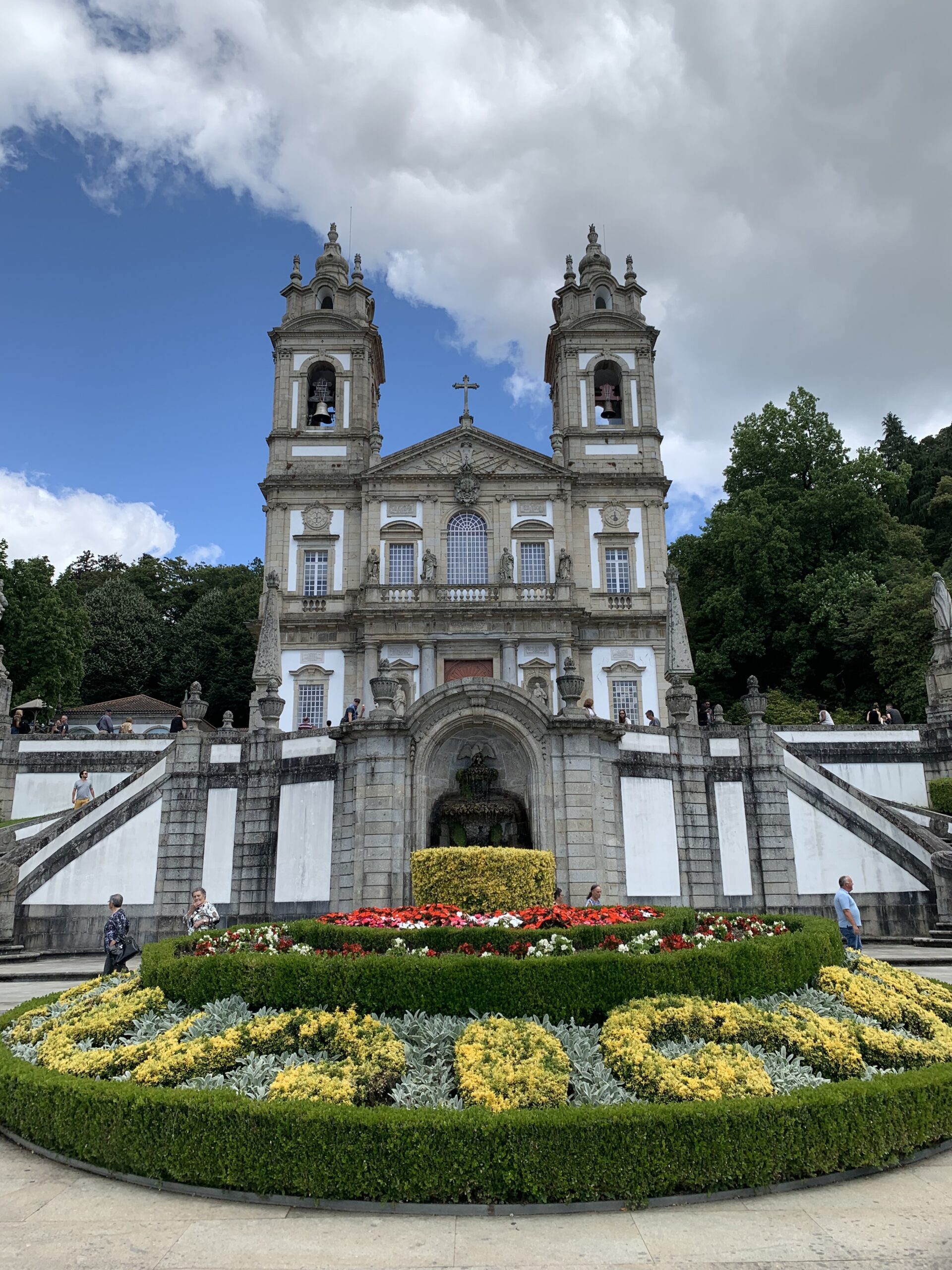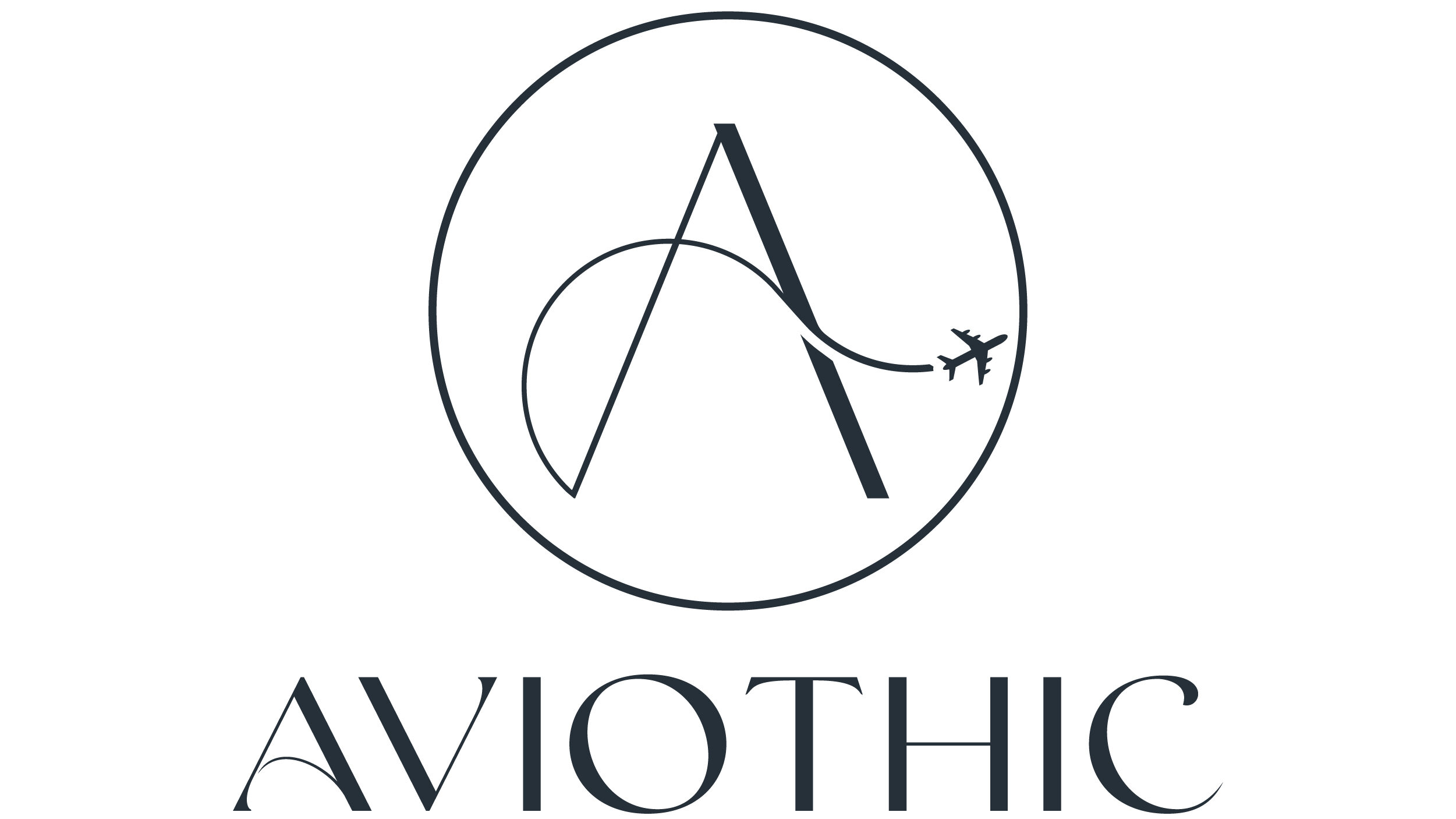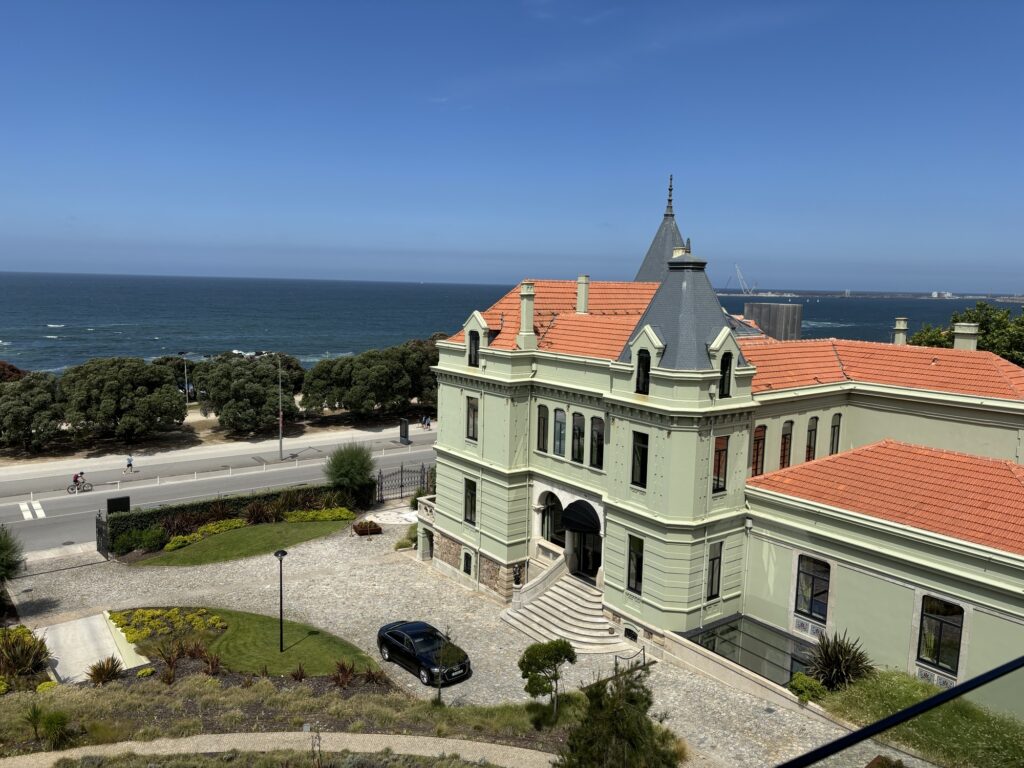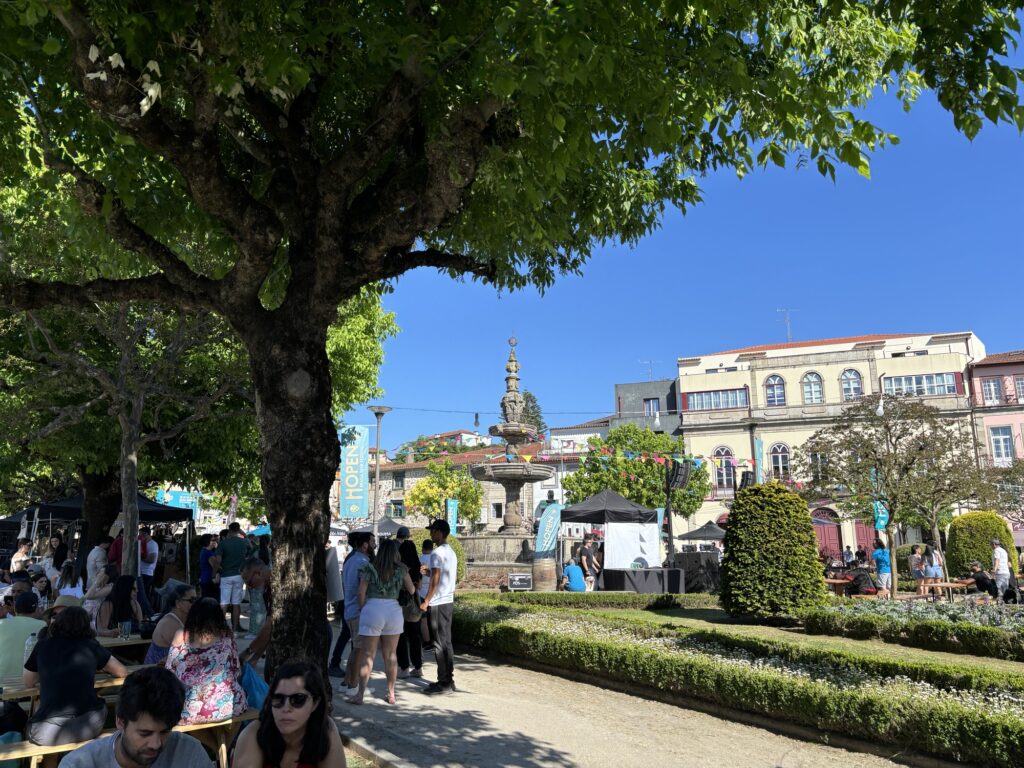
Adjusting to Life in Portugal (Part III)
Once we received our permit, we were official residents of Portugal and couldn’t have been more excited! If you’re curious about how we made the move, start here.
As we settled in, we had to acclimate ourselves to our new home, new city, and cultural norms – among many other things.
Here are some tips along with what we learned within our first few months:
Note: The following content includes some affiliate links. When you click and shop the links, we receive a commission.
Google Maps is Waaaayyyy Better than Apple Maps
We live in Braga, which is Portugal’s third largest city. Abundant in charm, it’s been a terrific starter city for us. That said, it’s not as metropolitan as its sister cities, Porto and Lisbon. We find that very few businesses have websites and if they do have an online presence, they’re usually only on Google Maps and Facebook (the latter of which we’re not on).
Generally speaking, we’ve found that business information is far more accurate on Google Maps than on Apple Maps (in terms of hours, location, etc.) so it’s the only app we use when we’re trying to figure out the operating hours of a restaurant or business.
Restaurants Open for Dinner Around 7:30p or Later
My husband and I are early bird eaters and usually eat dinner around 5pm (we’re literally 40 going on 80). In Portugal, most people have dinner around 8pm or even later, and restaurant hours reflect that; on average, most don’t open again until 7:30p (the earliest) for meal service.
Tipping
Tipping isn’t common in Portugal; however, a general rule of thumb is that if you’re extremely pleased with your experience (whether at a restaurant, hair salon, etc.), you should leave a 10% tip. Whenever I go to their hairdresser, I always leave a 10% tip (mainly because I get a Brazilian Blowout treatment, which is a labor-intensive service (it’s only 70 euro here vs. $300+ in the US. Can you believe?!)).
Always Take a Ticket
When we first arrived and went to the local butcher, we waited for about 20 minutes or so before we were helped, not realizing that whether you’re at the butcher, baker, or candlestick maker, Portugal, operates on a ticketing system. We learned that we always need to find the ticketing kiosk and grab a number in order to be served at most places (restaurants and cafes being the exception).
Grocery Stores
We don’t know what it is about this stage of our lives, but boy do we love a good grocery store! In the States, we were obsessed with Trader Joe’s and Whole Foods (we’re headed back to the States in November and believe you me, we’re bringing a giant suitcase with us so we can stock up on all of our favorite goodies!). While neither of those fan favorites exist here in Portugal, there are a few that we love:
- Continente (depending in the location, it can be like a Publix (IYKYK) or a Super Target)
- Pingo Doce (most similar to Super Target)
- Lidl (think of it as Aldi meets Trader Joe’s but with a fresh bread department)
- Aldi (it’s Costco meets Trader Joe’s)
- Mini-Preco (a mini mart that sells produce and packaged goods)
- Auchan (similar to Super Target)
Most offer great rewards programs so be sure to sign up; in the 10 months we’ve been here, we’ve accumulated almost $100 in cash back from Continente alone (our preferred grocery store).
I would be remiss if I didn’t mention the neighborhood markets, wine shops, talhos (butchers), and peixeira (fish mongers) are equally fabulous to shop too!
Yes, We Can Order Off of Amazon
“Can you buy things from Amazon?” has to be one of the top questions we got asked by friends and family when we first moved. The good news is yes (but there are some caveats)! While there isn’t an Amazon Portugal, you can purchase items from either Amazon Spain or Amazon Germany (they’ve got everything from pantry organizers to books in English to umbrellas). We’ve found that Amazon Germany has a larger selection of items compared to its Spanish counterpart (perhaps because there’s such a big expat population due to the size and abundance of American military bases).
Amazon Prime is available but only through the Spain version of the site (which includes free 2-day delivery to Portugal and Prime video); the cost is 4.99 euro/month. Unfortunately, you can’t use your US Prime membership in another country. 🙁 That said, you can use your Amazon Prime US membership to access shows/movies but you’ll need to have a VPN on (more on that below) in order to view their full content library (otherwise you’ll be heavily restricted since your geo-location will appear outside the US).
For most expats, they find value in keeping their US Prime subscription (for the videos) while also getting one for Spain for everyday household items.
AVIOTHIC TIP: You can’t use a US Amazon gift card on a foreign Amazon site (because the currencies are different). So, if loved ones want to send you one, they’ll need to do so for the Amazon country site you tend to use.
VPN & Streaming Services (Including Sports)
Second to getting asked about Amazon, another question we often get from loved ones is whether we can watch streaming services like Netflix, Hulu, etc. here and we’re happy to report that we can!
The most important aspect of getting access to them is ensuring we have our VPN on and set to a city in the US. VPN stands for Virtual Private Network and it allows you to change your IP address to different locations all over the world. We use NordVPN and ensure that all of our devices – iPhones, smart TV, tablets, laptops, etc. – are connected to it (set to the US) and we’ve never had an issue getting access to what we want to watch.
My husband was worried about being able to tune into NFL games but learned about DAZN and got the NFL Game Pass International (150 euro/year). He can easily watch all of his favorite games and loves it. Since the season is over, they’re only promoting their off-season sports pass but as we get closer to late summer, the NFL package will likely become available again.
Packages from USA
Getting packages from the US has been a challenge. Twice my mom tried sending me a small parcel twice (using different carriers), and both times, they’ve been returned to her after sitting in customs for MONTHS. Customs in Portugal is notoriously difficult.
The best advice we’ve received is if you must get a package from the US, (1) it shouldn’t be bigger than a flat envelope and (2) be sure to use DHL, as it tends to be the best carrier vs. FedEx or UPS (likely because it’s European-based). Otherwise, your best bet is either stock up on what you need when you’re States-side or have friends/family bring what you need if they make the trip out to Europe.
Cell Phone
We have unlocked iPhones, which means we can have a physical SIM (for our US number/provider) and an e-SIM (for our Portuguese provider, Vodafone). Our monthly bill for Vodafone is 45 euro and includes 10 GB per line (gigs can also be used in select EU countries when we travel) as well as unlimited minutes to Portuguese numbers.
If you have an iPhone, have loved ones text the email address associated with your Apple ID; this will ensure that regardless of which SIM you’re using, they’ll be able to get in touch with you (if you prefer iMessage over WhatsApp).
Language
It Ain’t Easy!
Although my husband and I have been here for 10 months, we still aren’t fluent in Portuguese (yet…). Literally (I mean LITERALLY), every single Portuguese person – we’ve ever spoken to – has told us how difficult of a language it is to learn. That’s ok – we’re not discouraged! I will say that my husband definitely has an advantage since he has some knowledge of Spanish (there’s some terminology overlap between the two languages).
Best Language App
We’ve also found the app, Practice Portuguese, to be very helpful because it teaches European Portuguese (Duolingo and other popular language apps focus on Brazilian Portuguese and there are a lot of pronunciation differences between the two dialects so it was important to us we learned the European way).
Language Certification
One incredible opportunity that the Portuguese government offers is Português Língua de Acolhimento (PLA). It’s a 6-month program offered once per year, geared to non-native speakers (ages 16+) to help them with language proficiency (you must have a residency permit to be eligible to participate).
It costs only 5 euro to register and the best part is, once you pass the course, you get a certificate that can be used as your proof of basic language proficiency (when applying for Portuguese nationality or permanent residency after 5 years (vs. taking a test)). We start our class this September and we’re so excited!
Making New Friends
We’ve met several friends just by being out and about in our city; having a dog has definitely helped since it makes us more social. There are many expat groups on Facebook you can check out for your local city where they offer monthly or even weekly meetups!
Portuguese News Sources
We stay up-to-speed on Portuguese news using a few key news outlets we enjoy:
Taxes
We use a tax accountant here in Portugal as well as one in the US. This is our first year filing taxes for both countries and we were advised to file an extension for the US and submit Portuguese taxes first (which are due by the end of June). Once we get our Portugal return back, we’ll then apply it to our US tax returns and any payments made to Portugal will be credited back to us via Uncle Sam (which will only happen the first 10 years of our residency, under NHR; you can read more here as the legislation’s changing).
After we complete this process, we’ll write a post about our entire experience, soup-to-nuts.
Quality of Living & Transportation
Walking
What we love about being in Braga is its walkability; we walk EVERYWHERE, usually averaging anywhere between 5-10 miles a day depending on what we’re up to. The tranquil Rio Este river runs through the city where there are bike and walking paths as well as recreational areas (that local families take their kids to play or soccer teams practice).
Bolts & Public Transit
When we do need to get somewhere further away, we’ll take a Bolt (which is Portugal’s version of Uber and Lyft); they tend to be very inexpensive. We’ve never taken the bus (just because we prefer walking), though it is used extensively in the city by locals. There isn’t a subway system in Braga but Lisbon and Porto offer excellent ones (if you’ll be moving in or near those cities).
Trains
Getting around Portugal is easy breezy; they have a great railway system that connects you to major cities throughout the country (or even to certain parts of Spain). We usually take the Alfa Pendular line (high speed train) from Braga to Lisbon whenever we head south and the ride is about 3h30. The cost varies depending on the class you book (there’s Economy and Business class – both are lovely but Business class is my favorite because it offers more open space).
Without a doubt, Ninja and Trainline are our favorite transit apps to use when booking train travel. Here’s some great info on navigating train travel within Portugal.
Cost of Living
You’re probably curious about what cost of living is like for us. Overall, it’s comfortable being here in Braga; for reference, here’s what we pay per month*:
- Rent: 900 euro (new 1 bed / 1 bath with terrace and small yard)
- Groceries: 250 euro (including alcohol)
- Utilities: 115 euro (electric, water, cable, internet)
- Eating out: 140 euro (on 6-8x/month)
- Misc: 100 euro (IKEA, Amazon, Bolt rides, etc.)
- Cell: 45 euro (for two lines)
- TOTAL: 1,550 euro
*Notes: All costs except rent are approximations and can fluctuate depending on needs month-to-month. Private health insurance is not included as we pay that upfront for the year ($2,000 per person for 2024).
Overall, we couldn’t be happier with our decision to move here. Undergoing the visa and permitting process was fairly manageable albeit challenging at times. That said, the tax benefits, safety, and general quality of life were all worth it. Moreover, traveling around Europe is a breeze with Porto airport nearby; we have tons of trips lined up for this year – Milan, Lake Como, Brussels, Antwerp, Amsterdam, Vienna, and several others (all of which will be shared on the blog 🙂).
Well, there you have it, folks! Hope you enjoyed this series on what our experience was like moving to Portugal! If you too are planning to make a similar move, start reading from here or, feel free to send us an email at info@theaviothic.com for any specific questions you might have about our own experience.
xoxox





